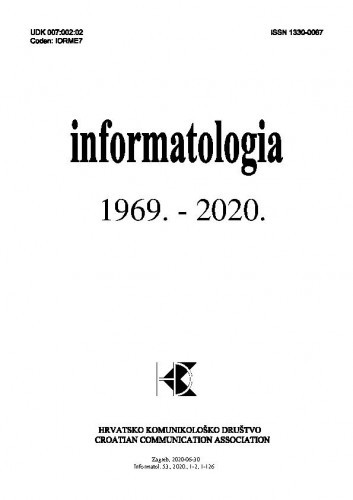One of the basic competences for lifelong learning is the development of digital competence, and especially at higher education institutions. There are long-term goals in economic and social progress in form of initiatives related to the ensuring the multiple information education. Due to the fact that there is not sufficient research aimed at assessing the initial state of information literacy within higher education institutions in Croatia, the goal of the present research is to determine the level of knowledge, more precisely the digital competence of teachers and educators in higher education institutions in the Republic of Croatia, the frequency of their usage of modern technologies in teaching, and to explain the necessity of implementing the multimedia and e-learning traning programmes at different faculties. The research was conducted on a representative sample (N = 1800) of teachers and associates at higher education institutions in the Republic of Croatia working in different departments in Osijek, Split and Zagreb. An online questionnaire was used to examine the level of their digital competence, and the frequency and the method of using modern technologies in teaching. The results of the research show that teachers and associates working at technical faculties are more competent in conducting their research scientific work and use the modern technologies significantly more than teachers and associates working in the area of social sciences and humanities. The results show that more than 70% of teachers and associates are assessing themselves as being digitally competent in the use of computers and new technologies, and over 60% of them regularly use media in their teaching practice.; Jedna od osnovnih kompetencija za cjeloživotno učenje je razvoj digitalne kompetencije, posebno na visokoškolskim ustanovama. Postoje dugoročni ciljevi ekonomskog i društvenog napretka u obliku inicijativa koje se odnose na osiguranje višestrukog informacijskog obrazovanja. S obzirom na to da u Hrvatskoj nema dovoljno istraživanja usmjerenih na ocjenu početnog stanja informacijske pismenosti unutar visokoškolskih ustanova, cilj je ovog istraživanja utvrditi razinu znanja, točnije digitalnu kompetenciju nastavnika u visokoškolskim ustanovama u Republici Hrvatskoj, učestalost njihove upotrebe suvremenih tehnologija u nastavi i objasniti nužnost provođenja multimedijskih i e-learning programa praćenja na različitim fakultetima. Istraživanje je provedeno na reprezentativnom uzorku (N = 1800) nastavnika i suradnika na visokim učilištima u Republici Hrvatskoj koji rade na različitim odjelima u Osijeku, Splitu i Zagrebu. Internetski upitnik korišten je za ispitivanje razine njihove digitalne kompetencije, učestalosti i načina korištenja suvremenih tehnologija u nastavi. Rezultati istraživanja pokazuju da su nastavnici i suradnici koji rade na tehničkim fakultetima kompetentniji za obavljanje svojih istraživačkih znanstvenih radova i koriste suvremene tehnologije znatno više od nastavnika i suradnika koji rade na području društvenih i humanističkih znanosti. Rezultati pokazuju da više od 70% nastavnika i suradnika ocjenjuje sebe digitalno kompetentnim za korištenje računala i novih tehnologija, a preko 60% njih redovito koristi medije u svojoj nastavnoj praksi.
Sažetak

 Informatologia : 53,1/2(2020) / glavni i odgovorni urednik, editor-in-chief Mario Plenković.
Informatologia : 53,1/2(2020) / glavni i odgovorni urednik, editor-in-chief Mario Plenković.